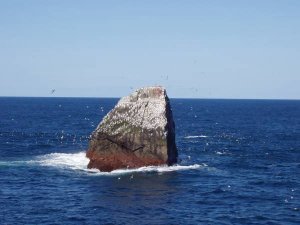
There it is. Rockall. Just hulking there, doing nothing. Par for the course, really. Which is to say, 17. Par for the golf course on Rockall is 17.
A Dublin councillor once altered his name to include the word 'Rockall' for reasons known only to his parish priest, Fr Tiernan Schrodinger OSM.
An SAS man once lived on it for a while, as part of a stag night prank, under the impression that he was in a Nottingham nightclub.
The Wolfe Tones have recorded a stirring patriotic ballad asserting the Irish claim to Rockall, in defiance of those evil Brits/Icelanders/Danes/Bolivians (delete as applicable), and rather than reproduce a single line of which the present author would gladly swim there and back.
Careful observation of the photographic evidence would seem to suggest that Rockall is covered in birdshit.
Someone has set up a website called http://www.rockallonline.com, whose history of the island contains the following useful information:
The inhabitants of the forested lowlands and northern grasslands of central Rockall were so severely decimated by plague that these regions long remained almost uninhabited. For many centuries the folk of the Northern and Eastern Mountains altogether lost contact with the peoples of the south. In the north, the Safaddnese people were long predominant, whereas the southern hills and plains became divided into a series of little realms, variously governed.When western Europeans discovered Rockall, new settlers began to arrive. Norsemen settled in the northwestern region, Irish in the Eastern Mountains and Englishmen widely in the central plains and forests. Not until the fifteenth century, however, did south and north resume contact.
That was at a time when Atlanteans from Vragansarat and the islands attempted a reconquest of their former empire, from the south with an army largely of mercenaries. Their defeat was followed by the attempted expansion of a second empire from the northeast (Pavonara); but that did not reach beyond the Northern Mountains and soon also collapsed.
After this, though Rockall was never wholly at peace, there were three centuries of relative tranquillity, ending when the rich ores of the Reschorese mines were discovered. A fresh wave of settlement from Europe began, the French and British both establishing territorial foot holds and the Germans forging an agressive alliance with Pavonara.
No comments:
Post a Comment